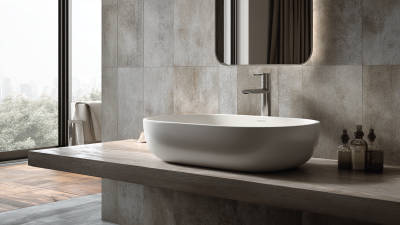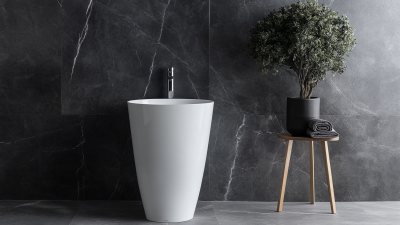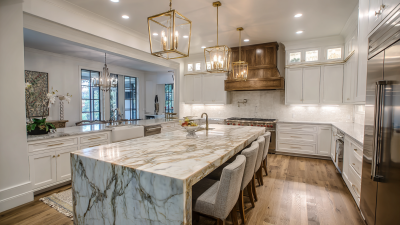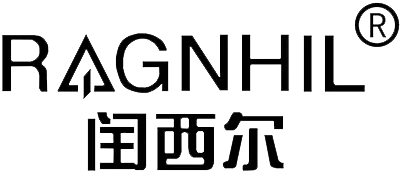Leave Your Message
The evolution of sanitation technology has reached a pivotal moment with the introduction of the Intelligent Toilet, transforming the concept of hygiene and comfort in the modern bathroom. These advanced fixtures are not merely functional but are designed to enhance user experiences through smart features that promote cleanliness, efficiency, and convenience. From automatic flushing to water temperature control and built-in bidets, Intelligent Toilets are revolutionizing personal hygiene practices and setting new standards for restroom facilities. As the world becomes increasingly tech-savvy, the demand for smart bathrooms that integrate advanced sanitation technologies is surging. This shift marks a significant cultural change, reflecting society's growing awareness of the importance of hygiene as well as the benefits of sustainable plumbing solutions. In this article, we will explore the various types of Intelligent Toilets, their innovative features, and the future of smart bathrooms that promise to enhance our daily routines.

The rise of intelligent toilets marks a significant transformation in the landscape of modern smart bathrooms, highlighting the ongoing evolution of hygiene practices. By 2025, the market for intelligent toilets is expected to reach an estimated $275.128 million, with projections showing it could expand to $6.39547 billion by 2033, growing at a remarkable compound annual growth rate of 11.12%. This surge in popularity underscores the increasing consumer demand for advanced sanitary solutions that enhance comfort and convenience while promoting better hygiene.
Cultural influences, such as Japan's unique “toilet culture”, play a vital role in shaping public perception of these innovations. The idea of a "toilet goddess" symbolizes the reverence for cleanliness and the belief that maintaining a pristine lavatory can lead to beauty and prosperity. This cultural narrative not only emphasizes the aesthetic value of sanitary spaces but also reflects a shift towards a more sophisticated understanding of hygiene. Intelligent toilets, with features designed for enhanced sanitation and user experience, are at the forefront of this hygiene revolution, paving the way for a future where smart bathrooms become standard in households worldwide.

Smart toilets are at the forefront of revolutionizing hygiene and comfort in modern bathrooms. These futuristic fixtures are designed with a variety of key features aimed at enhancing the user experience. One prominent feature is the bidet function, which provides a gentle cleansing with warm water, reducing the need for toilet paper and promoting better personal hygiene. Additionally, many smart toilets come equipped with heated seats, which offer a touch of luxury during colder months.
When using a smart toilet, ensure to regularly clean the sensor areas to maintain their effectiveness. It's also beneficial to familiarize yourself with all the settings to customize your experience, from water temperature to seat adjustments.
Another remarkable benefit of smart toilets is their self-cleaning capabilities, which often utilize UV light or strong jets of water to keep the bowl pristine. This not only saves time on maintenance but also reduces the use of harsh chemicals, making it an eco-friendly option. For maximum comfort, consider adjusting the pressure settings on the bidet feature, as this can greatly enhance your experience and promote a more personalized feel.
| Feature | Description | Benefits |
|---|---|---|
| Self-Cleaning | Automatic cleaning mechanism that uses UV light or electrolyzed water. | Enhances hygiene by reducing the risk of bacterial growth. |
| Heated Seat | Adjustable heated seat for maximum comfort. | Increases user comfort, particularly in colder climates. |
| Bidet Function | Built-in bidet for a more thorough cleaning experience. | Promotes better hygiene than traditional toilet paper. |
| Deodorizing Function | Automatic deodorizer to neutralize odors. | Keeps the bathroom environment fresh and pleasant. |
| Remote Control | Wireless remote for controlling various toilet functions. | Easy access to features without requiring physical interaction. |
| Water Saving Technology | Efficient flush systems that use less water. | Environmentally friendly and reduces water bills. |
The integration of IoT technology into bathroom sanitation marks a transformative shift in how we approach personal hygiene. Smart toilets equipped with sensors and connectivity features can monitor usage patterns, assess cleanliness, and even adjust their functionalities based on user preferences. This level of personalization not only enhances comfort but also promotes better hygiene practices. For instance, integrated cleansing and drying mechanisms minimize the need for toilet paper, significantly reducing waste and highlighting a more sustainable approach to sanitation.
Moreover, intelligent toilets can communicate with home networks, enabling users to remotely control functionalities like flushing or seat warming via smartphones or voice-activated devices. This connectivity fosters a sense of convenience, making everyday routines more efficient. Additionally, the data collected by these smart systems can be harnessed for health monitoring, providing early warnings for potential medical issues based on user habits. As this technology continues to evolve, it is poised to redefine the concept of cleanliness and safety in bathrooms, paving the way for a new era of smart sanitation solutions.
The issue of sanitation in India remains a significant challenge, with many regions lacking basic hygiene infrastructure. Despite widespread difficulties, the global toilet bowl market is thriving, expected to grow from $28.7 billion in 2024 to $60.71 billion by 2034, driven by a compound annual growth rate of 7.78%. This growth underscores an increasing awareness of the vital connection between water sanitation and public health, particularly in regions where access to clean facilities is limited.
Smart bathrooms, equipped with intelligent toilets, are paving the way for innovative hygiene solutions. These advancements not only enhance user experience but also pave the path for sustainability in hygiene practices. By integrating water-efficient technologies and minimizing waste, smart toilets can significantly reduce environmental impact. The urgency of addressing sanitation challenges globally is becoming ever more apparent, as inadequate facilities contribute to pollution and health risks. Embracing these intelligent solutions could be critical in fostering a cleaner, healthier future for communities in dire need of improved hygiene conditions.
The evolution of bathroom hygiene technology is on the brink of a
revolution, with intelligent toilets leading the way.
According to a report by ResearchAndMarkets, the global smart toilet market is projected to reach
$5.89 billion by 2026, growing at a compound annual growth rate
(CAGR) of 11.6% from 2021. This surge signifies a growing consumer
interest in enhanced hygiene solutions that provide convenience and health benefits.
Intelligent toilets are designed not only to improve user comfort but also to promote better sanitation,
with features such as self-cleaning, bidet functions, and built-in sensors that offer a personalized experience.

Moreover, the integration of smart technology in bathrooms is set to transform the user experience substantially. A recent study by Grand View Research indicates that the smart bathroom market is expected to expand to $31.79 billion by 2025, fueled by the demand for automated features that simplify daily routines. Innovations like automated flush systems, integrated health monitoring, and IoT connectivity are making smart bathrooms increasingly appealing to tech-savvy consumers who prioritize hygiene and efficiency. As these advancements continue to flourish, intelligent bathroom solutions may soon become the standard, paving the way for a cleaner and more intuitive approach to personal hygiene.






